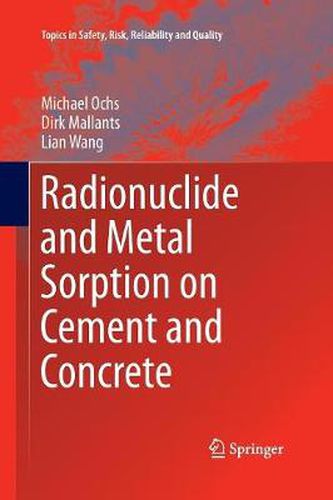Readings Newsletter
Become a Readings Member to make your shopping experience even easier.
Sign in or sign up for free!
You’re not far away from qualifying for FREE standard shipping within Australia
You’ve qualified for FREE standard shipping within Australia
The cart is loading…






This title is printed to order. This book may have been self-published. If so, we cannot guarantee the quality of the content. In the main most books will have gone through the editing process however some may not. We therefore suggest that you be aware of this before ordering this book. If in doubt check either the author or publisher’s details as we are unable to accept any returns unless they are faulty. Please contact us if you have any questions.
Cementitious materials are being widely used as solidification/stabilisation and barrier materials for a variety of chemical and radioactive wastes, primarily due to their favourable retention properties for metals, radionuclides and other contaminants. The retention properties result from various mineral phases in hydrated cement that possess a high density and diversity of reactive sites for the fixation of contaminants through a variety of sorption and incorporation reactions.
This book presents a state of the art review and critical evaluation of the type and magnitude of the various sorption and incorporation processes in hydrated cement systems for twenty-five elements relevant for a broad range of radioactive and industrial wastes. Effects of cement evolution or ageing on sorption/incorporation processes are explicitly evaluated and quantified. While the immobilisation of contaminants by mixing-in during hydration is not explicitly addressed, the underlying chemical processes are similar.
A quantitative database on the solid/liquid distribution behaviour of radionuclides and other elements in hydrated cement systems is established on the basis of a consistent review and re-evaluation of literature data. In addition to recommended values, all underlying original experimental data and key experimental info
rmation are provided, which allows users to trace the given recommendations or to develop their own set of key values.
This database is closely tied to the safety analysis of near surface disposal of radioactive waste in Belgium. It focuses on radioelements, toxic stable elements and heavy metals, which makes it relevant for investigations involving the interaction of radioactive and conventional contaminants with cement-based barriers.
$9.00 standard shipping within Australia
FREE standard shipping within Australia for orders over $100.00
Express & International shipping calculated at checkout
This title is printed to order. This book may have been self-published. If so, we cannot guarantee the quality of the content. In the main most books will have gone through the editing process however some may not. We therefore suggest that you be aware of this before ordering this book. If in doubt check either the author or publisher’s details as we are unable to accept any returns unless they are faulty. Please contact us if you have any questions.
Cementitious materials are being widely used as solidification/stabilisation and barrier materials for a variety of chemical and radioactive wastes, primarily due to their favourable retention properties for metals, radionuclides and other contaminants. The retention properties result from various mineral phases in hydrated cement that possess a high density and diversity of reactive sites for the fixation of contaminants through a variety of sorption and incorporation reactions.
This book presents a state of the art review and critical evaluation of the type and magnitude of the various sorption and incorporation processes in hydrated cement systems for twenty-five elements relevant for a broad range of radioactive and industrial wastes. Effects of cement evolution or ageing on sorption/incorporation processes are explicitly evaluated and quantified. While the immobilisation of contaminants by mixing-in during hydration is not explicitly addressed, the underlying chemical processes are similar.
A quantitative database on the solid/liquid distribution behaviour of radionuclides and other elements in hydrated cement systems is established on the basis of a consistent review and re-evaluation of literature data. In addition to recommended values, all underlying original experimental data and key experimental info
rmation are provided, which allows users to trace the given recommendations or to develop their own set of key values.
This database is closely tied to the safety analysis of near surface disposal of radioactive waste in Belgium. It focuses on radioelements, toxic stable elements and heavy metals, which makes it relevant for investigations involving the interaction of radioactive and conventional contaminants with cement-based barriers.